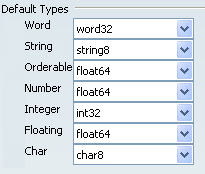Build | ||
| ||
Build Options

- Optimize
-
This option is dedicated to dataflow applications in order to generate a more compact code. When selected, this option merges all parallel actions inside the same control point, and removes dead code (for example, in an instruction like if true then... , the optimize option will remove the test).
The compilation might be long using this option for large programs, and debug information might be altered.
- Detect potential double emissions
-
If this option is selected, the compiler checks if potential double emissions of valued signals will or might happen at run time.
A warning is issued at compilation time if a valued signal is written or might be written more than once within the same cycle. Checking double emissions might be a heavy and long process for large programs.
However, for a given signal, if a double emission with a different value occurs during the execution of a program, the behavior cannot be guaranteed, because one signal value is arbitrary chosen by the compiler. Double emissions are not checked on pure signals: there is no conflict on a pure value.
Note: A double emission warning is not issued if a conflict affects a signal mapped to an input port of the block. The value of the input port is always chosen by the compiler. In this case, a warning is issued only if the signal is mapped to more than one input port.
![]()
Default Types

The LCM compiler does not generate code if any polymorphism (either full polymorphism expressed with a type variable 'any, or polymorphism of type class expressed with a type class variable 'any::class) remains before compiling a program (that is, before invoking the Build command).
For each type class, a default core type is chosen by the compiler from the user-defined type/type class correspondence table. Full polymorphism will generate an element with a pure value.
| Warning: Values appear in the drop-down boxes only if a LCM logic is loaded in session. |
